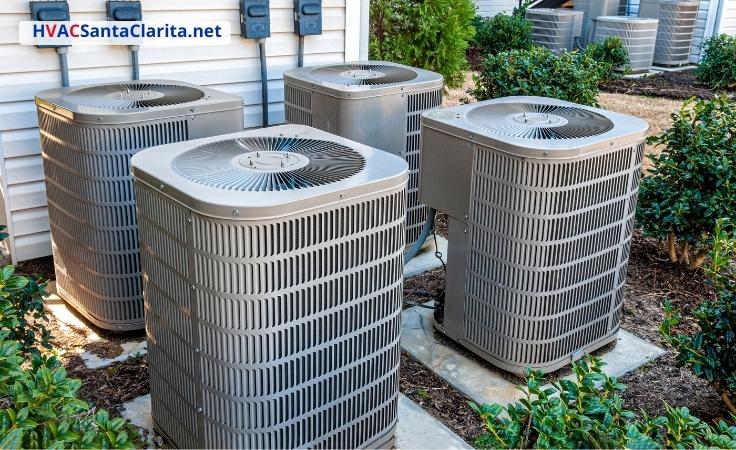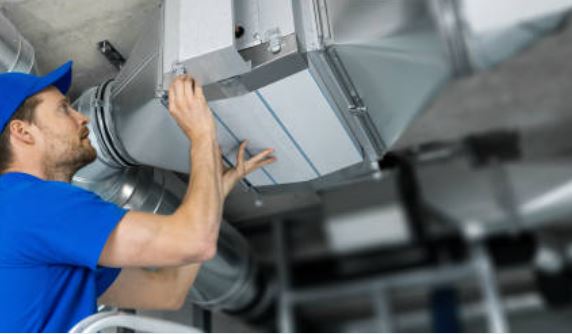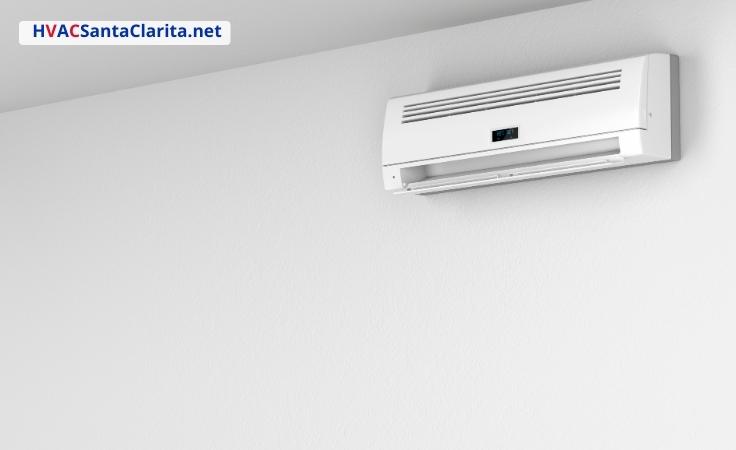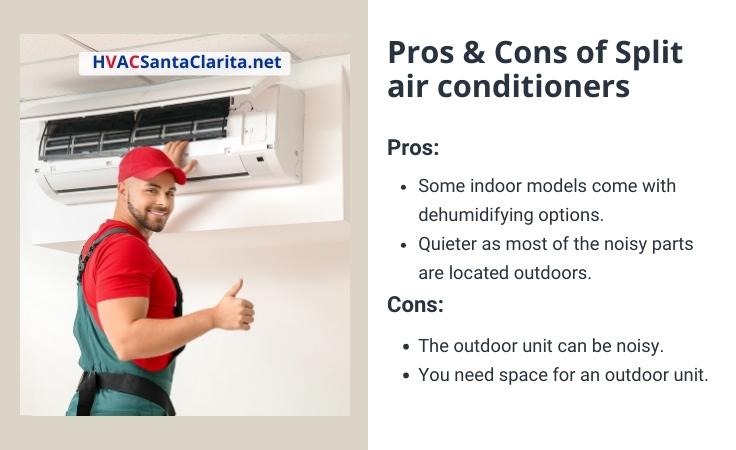Are you looking for types of central air conditioners?

If you want to buy a new one or upgrade your central air conditioning system, you need to get the right type for your needs.

call 661-888-0248
Contact us 24/7 for HVAC services!
A central air conditioner is ideal for homes with large spaces and multiple rooms that need to be cooled simultaneously.
However, not all central ACs will suit your needs appropriately.
In this article, we discuss the types of air conditioners.
And to help you choose your perfect match, we also discuss their pros and cons.
Let’s proceed directly to the details.
Types of Central Air Conditioners
Central air conditioning units are the most common type of AC in the US. They take cool air and circulate it through a network of supply ducts and return registers.
You can find these supply ducts and return registers in:
- Grills in the ceilings,
- wall openings,
- floor openings.
The duct network carries cool air throughout the house, cooling it. However, as the air moves through the house, it warms up. It, therefore, goes back to the unit where the refrigerant sucks out the heat from the air.
This is generally how a central air conditioning unit works.
Whatever your situation, house AC not cooling or looking to get a new one, start by looking at these types.
Type 1: Packaged Central Air Conditioners
Just like their name suggests, a packaged central air conditioner has the condenser, the evaporator and the compressor all packaged into one unit.

Typically, packaged central air conditioning units are located on the roof or, in some cases, on a concrete slab near the house.
They draw warm air from home, convert it into cool air, and then send it into the ductwork for distribution.
The supply and return ducts enter the home through its exterior wall or roof to connect with the packaged air conditioner.
Packaged central air conditioners come with electric heating coils or a natural gas furnace. This way, you will not need to buy a separate furnace for winter.
They are ideal for residential and small-scale commercial buildings. If you would like to have it installed, consider searching for commercial AC installation services in your area.
Pros of packaged central air conditioners

- No need for a separate furnace
- saves on space, therefore ideal for people with not much space,
- Easier and more streamlined maintenance and cleaning, as all parts are conveniently located in one place.
- more energy efficient than having to work with separate units,
- highly reliable and versatile.
Cons of packaged Central Air Conditioners
- They face more opportunities for damage. They endure harsh weather conditions as everything is located outside. Have an AC repair emergency service you can contact in case of damage.
Split System Air Conditioners
These are the second type of central air conditioners.

With split systems, there are two cabinets, unlike the single cabinet in a packaged central air conditioner.
One cabinet is located outdoors, commonly referred to as the outdoor unit. This outdoor cabinet contains the compressor and the condenser.
The second unit is located indoors. The indoor unit contains a furnace or a heat pump section.
There will also be evaporator coils in the indoor cabinet.
This system is most effective for individuals who already have a furnace but do not have an air conditioner.
Pros of Split System

- The most economical option for households with no cooling system,
- Some indoor models come with dehumidifying options,
- Quieter, as most of the noisy parts are located outdoors,
- You can individually control each indoor unit, making it particularly suitable for large houses that require different cooling levels.
- They are less susceptible to damage, but still require an HVAC service that can repair your system when damage occurs. A simple “AC fix near me” search will match you to your local technician.
Cons of Split Central air conditioner
- The outdoor unit can be noisy,
- You need space for an outdoor unit,
- Increased purchasing and installation costs; you have to cater for both indoor and outdoor units.
- Costlier maintenance.
Central Air Conditioner Frequently Asked Questions
We answer some commonly asked questions on the types of central air conditioners. Hopefully, this helps you choose your ideal air conditioner.
What are the types of air conditioning units?
- Ductless air conditioner
- central air conditioners, which can be either a packaged or split system,
- window air conditioner,
- portable air conditioner.
How long is the lifespan of a central air conditioning unit?
Most central air conditioners last 15 to 20 years. We, however, advise homeowners to start planning for a replacement if their units are more than ten years old. Some may break down beyond repair at 11 years.
Also, after ten years, air conditioners lose their efficiency. You may want to replace it with something with a higher seasonal energy efficiency ratio.
They should serve you for 15-20 years with proper maintenance and care(1).
What kind of central air conditioner do I need?
For economic purposes, you must choose the right central air conditioner type.
Our rule of thumb is to go for the split system if you already have a furnace but no air conditioner. However, go for a packaged system if you want to get it all in one. You will not need a separate furnace with a packaged system.
In terms of energy efficiency, it will highly depend on the SEER ratings.
What size central air conditioner do I need?
The size of your house (in square feet) should determine the size of the central AC you choose. For 500-1000 square feet.
For an additional 500 square feet, add half a ton to the air conditioner you are getting. Remember, the sizing of residential and commercial HVAC units varies.
However, if you are unsure about the size of the central air conditioner you should get, feel free to consult your local HVAC technician for a more accurate measurement. Remember, getting an undersized or oversized system will have serious drawbacks.
How do I choose a central air conditioning system?
The topic of how to choose central air conditioner is vast.
However, the primary factor to consider when selecting a central air conditioner is its seasonal energy efficiency rating (SEER). This indicates the amount of energy required to give a specific output.
If you choose a system with a higher SEER, you will enjoy higher energy efficiency and, therefore, lower monthly electric bills.
Final Thoughts on Types of Central Air Conditioning Systems
There we go for the two types of central air conditioning. If you want to install a new system or replace your current AC system, be sure to compare a split system and a packaged system. Consider their pros and cons to determine which system best suits your cooling needs.

call 661-888-0248
Contact us 24/7 for HVAC services!
Sources
https://www.energy.gov/energysaver/central-air-conditioning
